必修4 Unit 2 Working the land 听课手册
Unit2《Workingtheland》usinglanguage(人教版必修4)
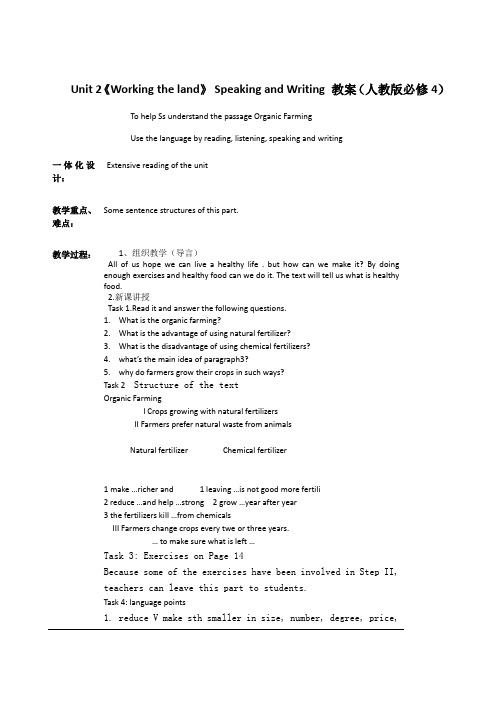
Unit 2《Working the land》Speaking and Writing 教案(人教版必修4)To help Ss understand the passage Organic FarmingUse the language by reading, listening, speaking and writingExtensive reading of the unit一体化设计:Some sentence structures of this part.教学重点、难点:教学过程:1、组织教学(导言)All of us hope we can live a healthy life . but how can we make it? By doingenough exercises and healthy food can we do it. The text will tell us what is healthyfood.2.新课讲授Task 1.Read it and answer the following questions.1.What is the organic farming?2.What is the advantage of using natural fertilizer?3.What is the disadvantage of using chemical fertilizers?4.what’s the main idea of paragraph3?5.why do farmers grow their crops in such ways?Task 2 Structure of the textOrganic FarmingI Crops growing with natural fertilizersII Farmers prefer natural waste from animalsNatural fertilizer Chemical fertilizer1 make …richer and 1 leaving …is not good more fertili2 reduce …and help …strong 2 grow …year after year3 the fertilizers kill …from chemicalsIII Farmers change crops every twe or three years.… to make sure what is left …Task 3: Exercises on Page 14Because some of the exercises have been involved in Step II,teachers can leave this part to students.Task 4: language points1.reduce V make sth smaller in size, number, degree, price,etce.g.This company tries to increase profits by reducing costs. We have reduced expenses this year.2.supply V give sb sth that is needed or usefule.g.He kept me well supplied with cups of coffee while I wrote the report.The shop was unable to supply what she wanted.In Britain milk is supplied to each house in bottles.3.whatever pron any or every(thing)e.g.we will be grateful for whatever amount you cab afford. Whatever I have is yours.4.refer to V mention or speak of sb/ste.g.When I said some people are stupid, I wasn’t referring to you. Don’t refer to this mater again.5.year after yeare.g.The villagers plant trees on the hill year after year4. 课堂练习Ss will translate some difficult sentences and analyze the structure of the sentences.5、布置作业:(1m’)To collect the information about the safety and importance of green food.6、课堂总结:(3m’)From now on we should manage to have organic food , right?。
Unit2WorkingtheLand语言点教案(人教版必修4).doc
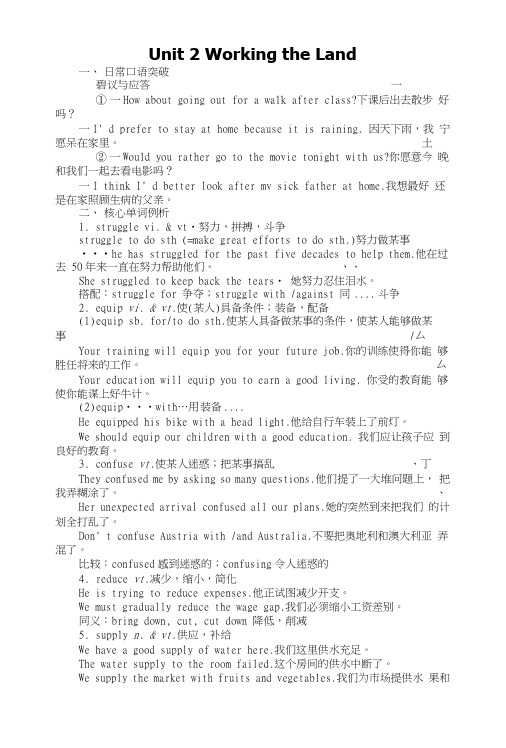
Unit 2 Working the Land一、日常口语突破碧议与应答一①一How about going out for a walk after class?下课后出去散步好吗?一I' d prefer to stay at home because it is raining. 因天下雨,我宁愿呆在家里。
土②一Would you rather go to the movie tonight with us?你愿意今晚和我们一起去看电影吗?一I think I' d better look after mv sick father at home.我想最好还是在家照顾生病的父亲。
二、核心单词例析1.struggle vi. & vt・努力,拼搏,斗争struggle to do sth (=make great efforts to do sth.)努力做某事•••he has struggled for the past five decades to help them.他在过去 50年来一直在努力帮助他们。
、、She struggled to keep back the tears・她努力忍住泪水。
搭配:struggle for 争夺;struggle with /against 同.... 斗争2.equip vi. & vt.使(某人)具备条件;装备,配备(1)e quip sb. for/to do sth.使某人具备做某事的条件,使某人能够做某事/厶Your training will equip you for your future job.你的训练使得你能够胜任将来的工作。
厶Your education will equip you to earn a good living. 你受的教育能够使你能谋上好牛计。
(2)e quip・・・with…用装备....He equipped his bike with a head light.他给自行车装上了前灯。
人教版高中英语必修4《Unit 2 Working the land》教案2篇
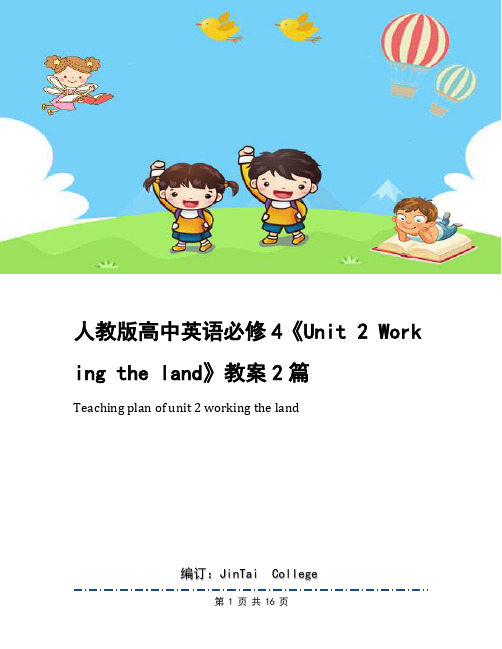
人教版高中英语必修4《Unit 2 Work ing the land》教案2篇Teaching plan of unit 2 working the land编订:JinTai College人教版高中英语必修4《Unit 2 Working the land》教案2篇前言:英语作为在许多国际组织或者会议上都是必需语言,几乎所有学校选择英语作为其主要或唯一的外语必修课。
英语教学涉及多种专业理论知识,包括语言学、第二语言习得、词汇学、句法学、文体学、语料库理论、认知心理学等内容。
本教案根据英语课程标准的要求和教学对象的特点,将教学诸要素有序安排,确定合适的教学方案的设想和计划、并以启迪发展学生智力为根本目的。
便于学习和使用,本文档下载后内容可按需编辑修改及打印。
本文简要目录如下:【下载该文档后使用Word打开,按住键盘Ctrl键且鼠标单击目录内容即可跳转到对应篇章】1、篇章1:人教版高中英语必修4《Unit 2 Working the land》教案2、篇章2:人教版高中英语必修4《Unit 2 Working the land》教案篇章1:人教版高中英语必修4《Unit 2 Working the land》教案教学准备教学目标(1)知识目标:让学生通过阅读课文更多地了解我国著名的农业科学家袁隆平的科研成果及其影响。
(2)能力目标:让学生进一步使用恰当地阅读方式与技能,如略读(skimming),快速阅读(fast reading),细读(close reading)等(3)情感目标:让学生不但学习袁隆平的科研精神,更要学习他不计较名利,踏踏实实的生活态度。
教学重难点1.阅读课文更多地了解我国著名的农业科学家袁隆平的科研成果及其影响。
教学过程1.话题的引导。
(Pre-reading)1).开头通过设计了一首熟悉的诗歌,让学生知道话题---farming.2).涉及到提高产量从而解决世界饥荒问题,从而引出本节课的中心话题--伟大人物袁隆平。
人教新课标英语必修4全册教案(Unit 2 Working the land)
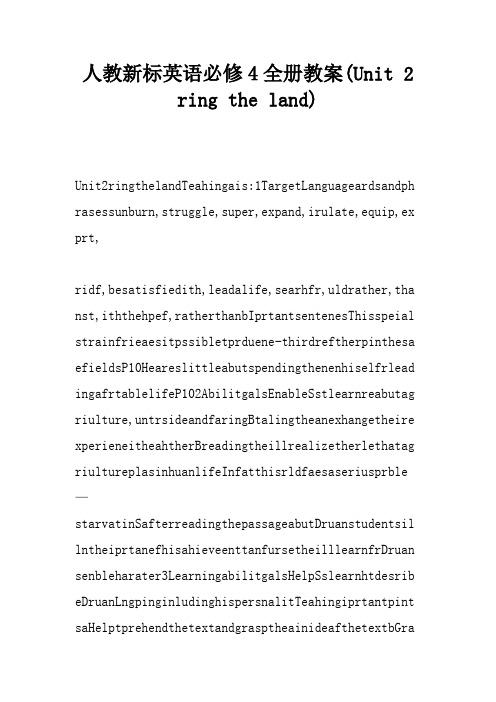
人教新标英语必修4全册教案(Unit 2ring the land)Unit2ringthelandTeahingais:1TargetLanguageardsandph rasessunburn,struggle,super,expand,irulate,equip,ex prt,ridf,besatisfiedith,leadalife,searhfr,uldrather,tha nst,iththehpef,ratherthanbIprtantsentenesThisspeial strainfrieaesitpssibletprduene-thirdreftherpinthesa efieldsP10Heareslittleabutspendingthenenhiselfrlead ingafrtablelifeP102AbilitgalsEnableSstlearnreabutag riulture,untrsideandfaringBtalingtheanexhangetheire xperieneitheahtherBreadingtheillrealizetherlethatag riultureplasinhuanlifeInfatthisrldfaesaseriusprble—starvatinSafterreadingthepassageabutDruanstudentsil lntheiprtanefhisahieveenttanfursetheilllearnfrDruan senbleharater3LearningabilitgalsHelpSslearnhtdesrib eDruanLngpinginludinghispersnalitTeahingiprtantpint saHelptprehendthetextandgrasptheainideafthetextbGrasptheusagefserdsandexpressinsHthelpstudentsaeupthei rindstaentributinsttherlandinthefuturelieDruanTeahi ngdiffiultpintsaHthelpstudentslearnreabutagriulture bHelpstudentsreallastertheusagefrdsandexpressinsTea hingethdsTaling,questining-and-anseringativitandrea dingTeahingaidsAtapererder,apretrandaputerTeahingpr edures≈≈asThefirstperidReadingStep1GreetingandRevisin1Greetthestudentsasnral2RevisethearingupiththefllingquestinHduthintgrurainfd--rie?-----1)First,thefarersplthefieldThehavetaeth esillseenughtplantrps2)Send,grseungplants3)Third,th einserttheungplantsintthelsefield4)Atlast,theillget theharvestStep2Pre-reading1Asthefllingquestins1)hat’stheainfdinanadaandUSA:-----ptatesandbread2)hatisth eainfdinSuthAeria:-----rn/aize3)hatistheainfdinSuth eastAsianuntries:-----rie2Shthestudentssepituresandasthequestinhatis happeningtthesepepleinEastAsianandSutheastAsianuntr ies?Thenshrenesliethat:InternatinalFatsnHungerandPvert1)Ever8sends,ahildsehereintherlddiesfrstarvatin2 )rethan800illinpepleintherldsufferfralnutritin---79 9illinfthearefrthedevelpingrldrethan13illinftheareu ndertheagefAtlastasthestudentstdisuss:Ifuhadthehane tdsethingthelpendhungerintherld,hatuldud?Enuragethe studentsttelltheirpinins,Thengiveanlusin:Thenlatslv ethefdshrtageprbleistinreasetheutputfthegrainrpperl andareathrughtheadvaneentfsieneandtehnlg3leadthestudentstpaattentintthepeple---uanLngpingAs: hatdunabuthi?--------FatherfHbridRieThenleadtthetpi fthereadingpassageAPineerFrAllPepleStep3ListeningLi stentthetape,trtfindutseinfratinftheherNae_________ ___Age____________b_____________Eduatin_________Ahieveent_______Hbbies __________Step4FastreadingReadthepassagequilandanse rthetrue-r-falsequestins•Druanisreafarerthanasientist•2Druan’sindfrieisthestsuitablefrhina’sfarland•3Druanuldratherrthanrelax•4Druanhasdreashenheisasleepandalshenheisaae•DruanensasiplelifethanstrihandfauspepleSteparefulre adingReadeahparagraphandanserthefllingquestins:Para 1:1hatdseDruanllie?h?2hatishisahieveent?Para2:hdidD ruananttinreasetherieutputhenheasung?2Hdeshehelprid therldfhunger?Para341hatindflifeisDruanleading?2hat isDruan’sdrea?Step6Siing:finduttheainideafeahparagraphParag raphainIdea1Hisappearaneandahieveents2Hisbirth,eduatinandresearh3H ispersnalit4HisdreaStep7Her1LearnthepeThePeasants’LtLiShenFarerseedingatnn,Seatdnthefieldsnhnsfdnatra,D uettheirtilingda?2FinishtheexerisesinLearningabutLa nguage3Retellthetextinabut10rdsNtes:aUsethefirstpersntretellthestrbTrtusetheprpernuntin sThesendperidLearningabutLanguageAisThelpstudentsle arnabutThe–ingfrastheSubet≈betThelpstudentsdisverandlearntu seseusefulrdsandexpressinsThelpstudentsdisverandlea rntuseseusefulstruturesPreduresIaringuparingupreadi ngaludthetextAPINEERFRALLPEPLELanguageislearnedinnt extSlet’sfirstreviethetextlearnedesterdabreadingitaludTrtfr euturEnglishsllandlearlIIDisveringusefulrdsandexpre ssinsInpairsdtheexerises1,2and3npages11and12uustfin ishtheininutesIIILearningabutgraar1ReadandidentifReadthetextabutuanLngpingagain,painga ttentintthesenteneshihusethe–ingfrasthesubetandbetInthesentene“ishingfrthings,hever,stnthing“the–ingisusedassubetItanbealsusedasbetfthesenteneFrexap le:uanLngpingliesplainghisvilin2nslidatingbdexerisesTnslidateurunderstandinguillbeg iven10inutestgverexerises1,2,3,4andnpages12and13uaustritenurtextbIeanthestudent’sbuareringbIIIReadusedaterialsfrThe–ingfrastheSubet≈bet)语法学习——动名词1动名词作主语1)名词直接放在句首作主语。
新人教版高中英语必修四unit 2《working the land》优秀教案2(重点资料).doc
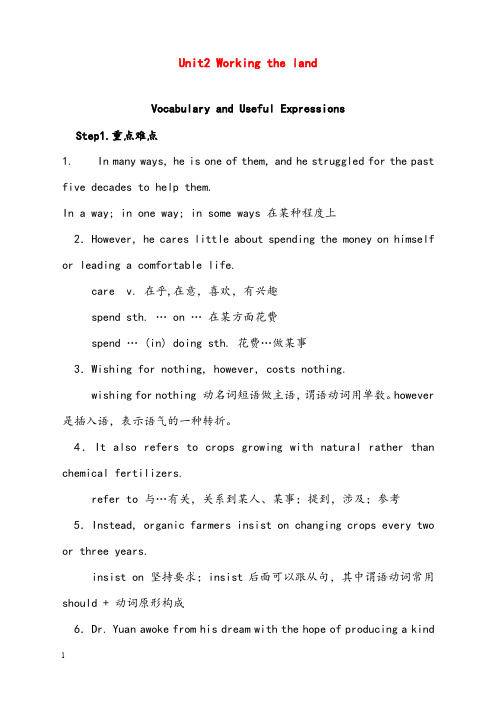
Unit2 Working the landVocabulary and Useful ExpressionsStep1.重点难点1. In many ways, he is one of them, and he struggled for the past five decades to help them.In a way; in one way; in some ways 在某种程度上2.However, he cares little about spending the money on himself or leading a comfortable life.care v. 在乎,在意,喜欢,有兴趣spend sth. … on …在某方面花费spend … (in) doing sth. 花费…做某事3.Wishing for nothing, however, costs nothing.wishing for nothing 动名词短语做主语,谓语动词用单数。
however 是插入语,表示语气的一种转折。
4.It also refers to crops growing with natural rather than chemical fertilizers.refer to 与…有关,关系到某人、某事;提到,涉及;参考5.Instead, organic farmers insist on changing crops every two or three years.insist on 坚持要求;insist后面可以跟从句,其中谓语动词常用should + 动词原形构成6.Dr. Yuan awoke from his dream with the hope of producing a kindof rice that could fees more people.with the hope of 带着某种希望7.He used to walk to his fields twice a day, but now he prefers to ride his motorcycle.used to 过去常常(现在已经不是如此)be used to doing 意思是“习惯于”prefer to do (rather than do) 相比之下更喜欢做某事8.But whatever they grow they make sure that what is left in the ground after harvesting becomes a natural fertilizer for the next year’s crop.whatever引导让步状语从句,表示“无论怎样”,相当于no matter what. Eg: Whatever you do, don’t give up.Step 2.功能句型建议(Suggestion & advice)I would rather … I don’t like … because …I’d prefer … because … It’s a great pity that …Should we/I …? It’s better to …If I have a choice I’d choose … because … You need to …May I suggest …? Let me suggest … because …Perhaps we should suggest … because … But what/how about …?Step 3. 重点单词及短语单词① hunger n. 饥饿,食欲;v. 渴望得到某事物,某人hunger for/after sth./sb.② struggle vi.stuggle with sb. 与某人争斗,搏斗struggle (against/with sb./sth.)struggle against/with sb./sth. (for sth.) 争斗,拼搏,奋斗,努力③ expand vi. (使某事物)变大,增强,伸展,张开expand on sth. 阐述或详述expansion n. 扩大,扩展,膨胀④ equip vt.equip sb./sth. (with sth.) 配备,装备equipment n. 设备,装备⑤ export vt. 输出;n. 出口业,出口品import vt. 进口⑥ circulate vi. vt. 使某物循环,流通,传播;vt. 发侧知告知某人 circulation n. 循环,流传,传播⑦ confuse vt. 把某人弄糊涂,使为难,打乱confusion n. 混乱,混淆⑧ reduce vt. 缩减,减小,降低reduction n. 减少,缩小⑨ supply vt. 供给,供应,满足;n. 供应,供给之物⑩ exchange vt. 交换,交易;n. 交换,更换,互访,交流 exhange sth. with sth.exchangeable adj. 可交换的,可退换的,可兑换的短语rid … of 清除,摆脱be satisfied with = be contented 感到满足,满意的would rather do sth. 宁可做某事refer to 与…有关,关系到某人,某事,提到,参考search for 寻找,搜寻thanks to 多亏,由于rather than 而不,宁愿…而不Unit2 Working the landWarming Up, Pre-reading and Reading Period 1 Warming up and pre-reading.Step 1 Lead-in.Poem By Li ShenFarmers weeding at noon,Sweat down the field soon. Who knows food on a tray,Due to their toiling day.Then let one student recite the poem in Chinese.Step 2 Warming up by questioningHello, everyone. We shall read about man who works the land today. Have you ever grown any plants? If not, what kind of plant would you like to grow? How will you grow it?(For reference: Mr. Li, I worked with my father in the rice field last year. We grow hybrid rice and use animal wastes to make the soil rich.)Has anyone of you ever been to the countryside? What did you do there? (For reference: I went to Chuankou the day before yesterday. It is a small mountain village 75 li north of Beijing. I went there to visit my uncle’s family. I like that small beautiful village very much. )Who are from a farmer’s family? What do you know about farming? Step 3 Pre-reading and talkingQuestioning and answeringRice is main food in South China. What do you think would happen if tomorrow there was suddenly no rice to eat?(For reference: Then the south people would have to change their eating habit. They could turn to potatoes, wheat flour, cow and sheep cheese, cabbage, onions and garlic for food. They are the bases ofthe traditional food in North China. )If you had the chance to do one thing to help end hunger in the world, what would you do?(For reference: I would try to end hunger by popularizing the advanced farming techniques. Modern techniques could be introduced to increase the rice output, and expand the area of fields.)Giving background information about Professor Yuan Longping Have you ever heard of a man called Professor Yuan Longping? Would anyone of you tell the class something about him?(For reference: Professor Yuan Longping is a Chinese agricultural scientist. Professor Yuan's breakthrough scientific achievement led to the world's first successful and widely grown hybrid rice varieties, revolutionizing rice cultivation in China and tripling production over a generation. His approach to rice breeding then spread internationally throughout Asia and to Africa and the Americas, providing food for tens of millions and leading to his becoming known as the "Father of Hybrid Rice."Step 4. ReadingReading aloud to the recordingComprehension—understanding what you are reading—is important. To read in thought groups is an easy, yet effective, way of improving reading comprehension. Now turn to page 9 and read aloud to therecording of the text A PIONEER FOR ALL PEOPLE. Pay attention to the thought groups in the sentences while listening and reading aloud.A brief introduction:Yuan Longping is known as China’s “father of hybrid rice”. It’s said that in China, we eat depending on “Two Ping” ---- Deng Xiaoping, who made the policy of System of Production Responsibility, & Yuan Longping, who invented hybrid rice.Yuan Longping, who was born in September, 1930, graduated from Agriculture Department in Southwest Agricultural Institute. He has been working on agriculture education & the research into hybrid rice since he left the institute.In the 1960s, when China was suffering from serious famine, he came up with the idea of hybrid rice, which has a high yield ( or output). Ten years later, he succeeded in inventing a new species that produced a 20 percent higher yield than common types of rice. Yuan devoted himself to the research into agriculture, & was honored by UNESCO & FAO(联合国教科文组织). Although he is 74 years old, he is still working on the research into agriculture.Period 2 ReadingStep 1 Lead-in。
必修4Unit2Workingtheland听课手册.pdf

Unit 2Working the land假如你住在一个涉外小区。
社区委员会请你帮忙根据以下提示用英文写一封电子邮件,将社区邀请居民参加“乡村耕作活动”的细节传达给住户。
活动宗旨亲近自然,锻炼身体参加人员所有感兴趣的小区居民内容种菜、养花、喂鱼等时间本周六上午9:00—12:00(如果天气允许)地点距离小区5千米远的一家农场出行方式集体骑自行车前往精彩美文Hi, everyone!To get close to nature and do more exercise, all residents w ho are interested in farming are in v ited to take part in an acti v ity organized by the Committee of our community. Weather permitting, w e'll ride bicycles to do some farming this Saturday on a farm, about 5 kilometres away from our community from 9:00 am to 12:00 am. We can grow some vegetables, plant some flowers, and raise fish in the lake nearby. You will be trained and guided w hile farming. Not only w ill you enjoy the pleasure of labour and relax, but also you can taste fresh products p icked by your own hands if you are willing to.Everyone is welcome to attend!名师点睛1.文章体裁:应用文——电子邮件。
高中英语必修四《unit2 Working The Land 》全英文说课稿
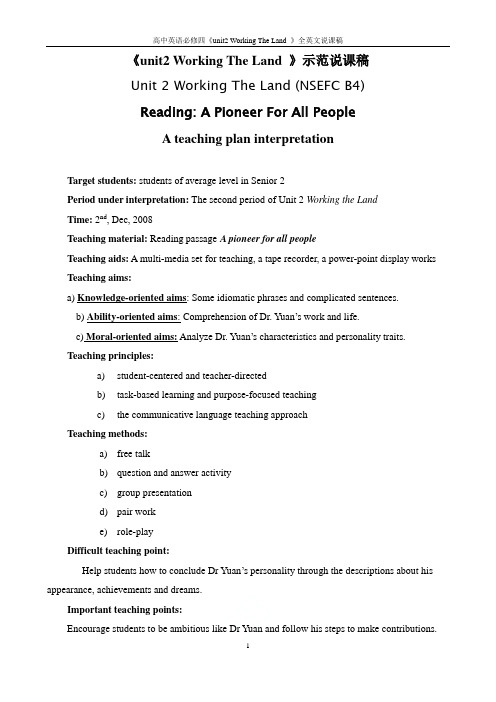
《unit2 Working The Land 》示范说课稿Unit 2 Working The Land (NSEFC B4)Reading: A Pioneer For All PeopleA teaching plan interpretationTarget students: students of average level in Senior 2Period under interpretation: The second period of Unit 2 Working the LandTime: 2nd, Dec, 2008Teaching material: Reading passage A pioneer for all peopleTeaching aids: A multi-media set for teaching, a tape recorder, a power-point display works Teaching aims:a) Knowledge-oriented aims: Some idiomatic phrases and complicated sentences.b) Ability-oriented aims: Comprehension of Dr. Yuan’s work and life.c) Moral-oriented aims: Analyze Dr. Yuan’s characteristics and personality traits.Teaching principles:a)student-centered and teacher-directedb)task-based learning and purpose-focused teachingc)the communicative language teaching approachTeaching methods:a)free talkb)question and answer activityc)group presentationd)pair worke)role-playDifficult teaching point:Help students how to conclude Dr Yuan’s personality through the descriptions about his appearance, achievements and dreams.Important teaching points:Encourage students to be ambitious like Dr Yuan and follow his steps to make contributions.Exploring work before class:•New words & expressions•Assigned the students to surf on the Internet to find out some information about Chinese agriculture and Yuan Longping.Aims: 1. Remove the language obstacles before class and develop students’ habit of self-study.2. Gain some background information about Yuan Longping.Teaching procedures:Step 1: Lead-in (2m’)Show pictures of hungry Africans and draw out Dr. Yuan.Aim: To grab students’ attention and lead in the topic of the passage.Step 2: Task-based reading (7m’+ 5m’+8m’)1. First reading (group work and discussion) (7m’)The students will be given 7 minutes to skim for:1) the main idea of the whole passage (4m’)2) the main idea of each paragraph (3m’)Aim:To enable students to get a general idea and the organization of the passage.2. Second reading (individual work and chart filling) (5m’)Students will be divided into 4 groups to finish 4 different tasks. This time more detailed information is called for. After the reading, there will be different tasks for different groups. Group 1: Dr Yuan’s appearance and Dr Yuan’s achievementGroup 2: Dr Yuan’s biographyGroup 3: Dr Yuan’s personalityGroup 4: Dr Yuan’s dreamsAim: This task is aimed to develop students’ ability of reading for useful information within a limited time. Meanwhile, the teacher can help to remove the language obstacles in the reading passage.3. Dig-in reading (pair work and personality recognition) (8m’)How do you like Dr. Yuan? What characters can you conclude from these sentences?Try to summarize Dr. Yuan’s characteristics.Aim: To enable students to get a deeper understanding of Dr. Yuan and appreciate his noble personality.Step 3: Movie watching (3m’)A 3-minute short movie about Dr. Yuan will be played in order that the whole class may know him better.Aim: To know Dr. Yuan better in a vivid way.Step 4: An interview (pair work and role-play) (5m’+5m’)Suppose Dr. Yuan will visit our school and he will answer the questions after a speech.Prepare some questions, which may cover his life, agricultural research work, even his hobbies or love story and then show your interview.Aim:1. The interview focuses on teamwork, cooperation and collaboration.2. The purpose is to develop the students’ random thinking skills and practice their oral English.Step 5: Feedback (number game) (4m’)The students will play a number game--- What’s your lucky number? There are nine numbers to choose from and each number represents a different task. The task is mainly about the words, phrases and comprehension of the passage.Aim:To check the teaching effect and consolidate students’ basic knowledge about words and sentences.Step 6: Self assessment and assignment (1m’)Check out how much you have learned in class!Write an article which is entitled Dr. Yuan in my eyes.Aim: 1.To expand the information and to broaden students’ minds.2.To consolidate the knowledge and help improve students’ writing.。
高中英语《Unit2 Working the land》教案(1)新人教版必修4
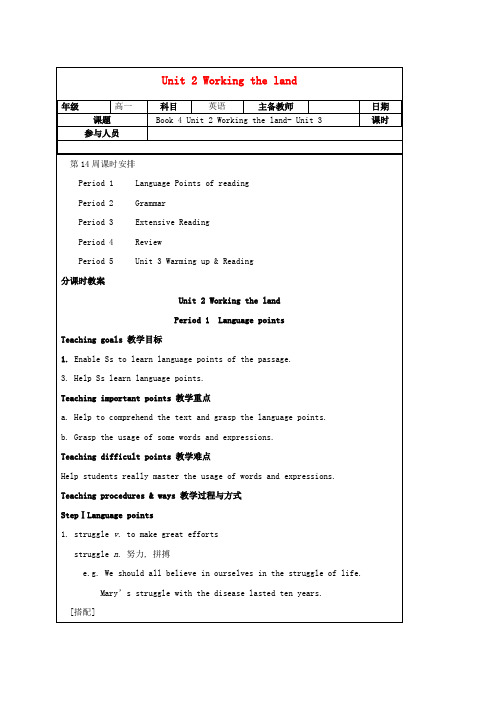
struggle to do sth.努力做某事
The children talked so loudly at the dinner table that I had to struggle ____.
A. to be heardB. to have heard
would rather更喜欢
2) I would rather choose to give up than give in to him.
3) I would rather write to him than call him.
would rather意为________,常用结构为_____________________
Unit 2 Working the land
年级
高一
科目
英语
主备教师
日期
课题
Book 4 Unit 2 Working the land- Unit 3
课时
参与人员
第14周课时安排
Period 1 Language Points of reading
Period 2Grammar
Period 3 Extensive Reading
A. focusB. focused
C. would focusD. had focused
C. hearingD. being heard
【点拨】I与hear之间构成逻辑上的被动关系,struggle to do可知选A项。
用struggle及其短语的适当形式完成下列句子。
1. We should be brave to _________ (同……做斗争) the difficulty.
人教课标必修4 Unit2 Working the land 教案
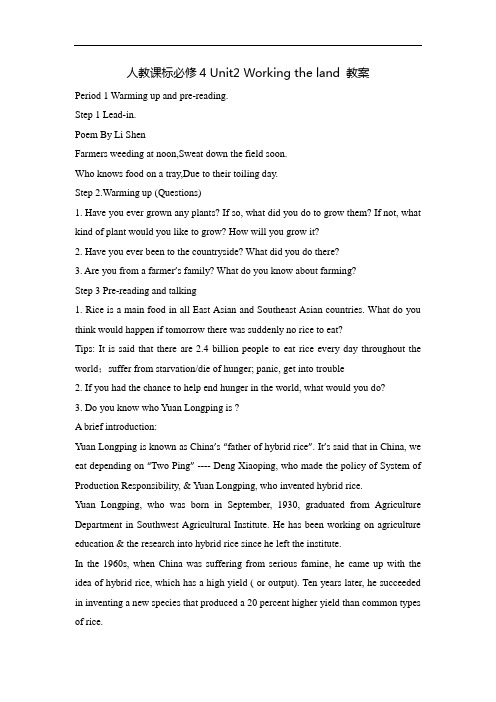
人教课标必修4 Unit2 Working the land 教案Period 1 Warming up and pre-reading.Step 1 Lead-in.Poem By Li ShenFarmers weeding at noon,Sweat down the field soon.Who knows food on a tray,Due to their toiling day.Step 2.Warming up (Questions)1. Have you ever grown any plants? If so, what did you do to grow them? If not, what kind of plant would you like to grow? How will you grow it?2. Have you ever been to the countryside? What did you do there?3. Are you from a farmer’s family? What do you know about farming?Step 3 Pre-reading and talking1. Rice is a main food in all East Asian and Southeast Asian countries. What do you think would happen if tomorrow there was suddenly no rice to eat?Tips: It is said that there are 2.4 billion people to eat rice every day throughout the world;suffer from starvation/die of hunger; panic, get into trouble2. If you had the chance to help end hunger in the world, what would you do?3. Do you know who Yuan Longping is ?A brief introduction:Yuan Longping is known as China’s “father of hybrid rice”. It’s said that in China, we eat depending on “Two Ping” ---- Deng Xiaoping, who made the policy of System of Production Responsibility, & Yuan Longping, who invented hybrid rice.Yuan Longping, who was born in September, 1930, graduated from Agriculture Department in Southwest Agricultural Institute. He has been working on agriculture education & the research into hybrid rice since he left the institute.In the 1960s, when China was suffering from serious famine, he came up with the idea of hybrid rice, which has a high yield ( or output). Ten years later, he succeeded in inventing a new species that produced a 20 percent higher yield than common types of rice.Yuan devoted himself to the research into agriculture, & was honored by UNESCO & FAO(联合国教科文组织). Although he is 74 years old, he is still working on the research into agriculture.Period 2 ReadingStep 1 Lead-in。
人教版高中英语必修4《Unit 2 Working the land》教案
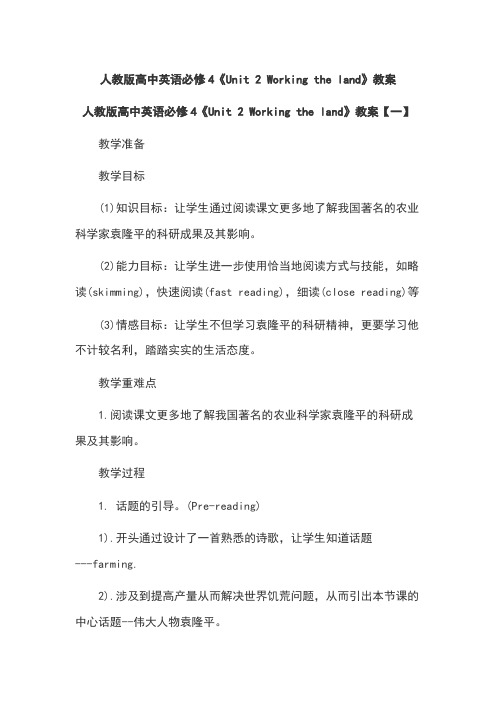
人教版高中英语必修4《Unit 2 Working the land》教案人教版高中英语必修4《Unit 2 Working the land》教案【一】教学准备教学目标(1)知识目标:让学生通过阅读课文更多地了解我国著名的农业科学家袁隆平的科研成果及其影响。
(2)能力目标:让学生进一步使用恰当地阅读方式与技能,如略读(skimming),快速阅读(fast reading),细读(close reading)等(3)情感目标:让学生不但学习袁隆平的科研精神,更要学习他不计较名利,踏踏实实的生活态度。
教学重难点1.阅读课文更多地了解我国著名的农业科学家袁隆平的科研成果及其影响。
教学过程1. 话题的引导。
(Pre-reading)1).开头通过设计了一首熟悉的诗歌,让学生知道话题---farming.2).涉及到提高产量从而解决世界饥荒问题,从而引出本节课的中心话题--伟大人物袁隆平。
2. 跟读与限时阅读完成导学案练习贯彻目的与困难策略,指导学生根据不同的阅读目的,在阅读的不同阶段,灵活使用各种阅读策略,捕捉文章主要信息,理解作者的写作意图,突破本文的教学重点与难点。
采用整体语言教学法和任务型语言教学法。
1)、通过限时阅读训练,引导学生如何利用略读(skimming)的方法把握文章的大意,侧重培养快速阅读理解能力和文章中心把握能力。
2)、精读各个段落语段,侧重培养快速捕捉文章重要细节的能力和猜测生词的能力,学会欣赏文章中的优美句子。
3:阅读过程--浅层次阅读。
(Reading I)1). 其中关于人物的基本信息中,通过设计了一个信息表格的浅层次阅读练习,对文中人物有了初步了解。
2). 关于他的梦想,书本上描写得非常生动,我让班里有艺术特长的学生画了一幅漫画,利用画面反映课文第四段所描述的内容,同时用第一人称配了声音效果。
4. 阅读过程--深层次阅读。
(Reading II)在处理了一些简单信息之后,阅读人物最重要的是要读出人物不同于其他人的成就以及值得学生学习的一些可贵品质。
人教版必修四Unit2《WorkingthelandPeriod4Listening》word教案
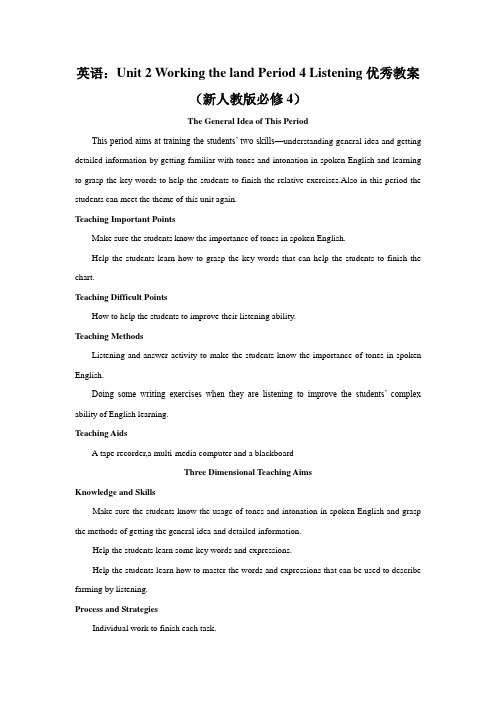
英语:Unit 2 Working the land Period 4 Listening优秀教案(新人教版必修4)The General Idea of This PeriodThis period aims at training the students’ two skills—understanding general idea and getting detailed information by getting familiar with tones and intonation in spoken English and learning to grasp the key words to help the students to finish the relative exercises.Also in this period the students can meet the theme of this unit again.Teaching Important PointsMake sure the students know the importance of tones in spoken English.Help the students learn how to grasp the key words that can help the students to finish the chart.Teaching Difficult PointsHow to help the students to improve their listening ability.Teaching MethodsListening-and-answer activity to make the students know the importance of tones in spoken English.Doing some writing exercises when they are listening to improve the students’ complexability of English learning.Teaching AidsA tape recorder,a multi-media computer and a blackboardThree Dimensional Teaching AimsKnowledge and SkillsMake sure the students know the usage of tones and intonation in spoken English and graspthe methods of getting the general idea and detailed information.Help the students learn some key words and expressions.Help the students learn how to master the words and expressions that can be used to describefarming by listening.Process and StrategiesIndividual work to finish each task.The teacher may play the tape a few more times to make the students hear clearly.Feelings and ValueThe students will know more about how to describe farming by listening to the dialogue.Teaching ProceduresStep 1 Revision1.Greetings.2.T:Last class we learnt something about organic farming,now I want to ask some of you to tell me the advantages of organic farming and the disadvantages of chemical fertilizer.(Revise the main content of last class.)Step 2 Listening on Page 14Pre-listeningThe purpose of this story is to illustrate the practical benefits of organic farming methods.It shows the good consequence of using natural fertilizers.ListeningTask 1:Ss listen to the tape and fill the chart.( play the tape for three times )The teacher asks some students to give their answers,and give the right answers.Suggested answers:1.carrots;cucumbers;pumpkins2.carrots;cucumbers;pumpkins3.chemical4.natural5.water6.water7.empty inside8.solid and healthy insideStep 3 Listening on Page 48The purpose of the listening passage is for the students to realize that deserts are not inevitable.They have come about through neglect over a long period of time.Ss give their ideasabout deserts before listening.Task 1:The students listen to the tape twice and finish Wb Ex.1 and 2 on Page 48,then check theanswers.Suggested answers:Ex.1:Fertile farmland (1)Land becomes dry (3)Soil is blown away (5)Not enough water (2)Plants die (4)Soil turns to sand (6)Ex.2:1.A;C 2.D3.CTask 2:Ss listen to the tape for the third time and discuss in pairs:What advantages do you think there are in turning desert back into farmland?Ask some students to give their own answers,then show the students the suggested answer:I think the advantages are:firstly,there is more land that can be used to grow food;secondly,the desert can be stopped from expanding.Step 4 Homework1.Finish the listening exercised on the English weekly.2.Prapere for the next class.The Design of the Writing on the BlackboardUnit 2Working the landPeriod 4Listening1.nutrition n.营养;滋养;食物2.Listening skill:When you listen to the tape,you should write down some key information about the exercises.Record after TeachingActivities and ResearchTo fully understand the advantages of organic farming,the students may be asked to carry out a research into the benefits of organic farming.Reference for Teaching。
英语:Unit2 《Working the land》教案(新人教必修4)
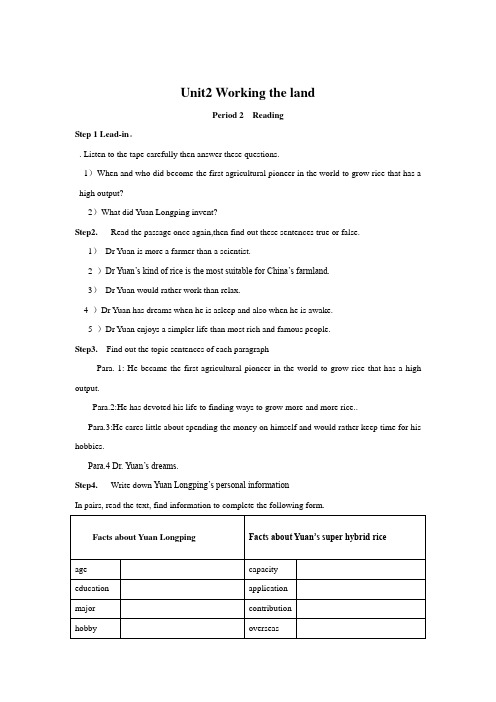
Unit2 Working the landPeriod 2 ReadingStep 1 Lead-in。
. Listen to the tape carefully then answer these questions.1)When and who did become the first agricultural pioneer in the world to grow rice that has a high output?2)What did Yuan Longping invent?Step2. Read the passage once again,then find out these sentences true or false.1)Dr Yuan is more a farmer than a scientist.2 )Dr Yuan’s kind of rice is the most suitable for China’s farmland.3)Dr Yuan would rather work than relax.4 )Dr Yuan has dreams when he is asleep and also when he is awake.5 )Dr Yuan enjoys a simpler life than most rich and famous people.Step3. Find out the topic sentences of each paragraphPara. 1: He became the first agricultural pioneer in the world to grow rice that has a high output.Para.2:He has devoted his life to finding ways to grow more and more rice..Para.3:He cares little about spending the money on himself and would rather keep time for his hobbies.Para.4 Dr. Yuan’s dreams.Step4. Write down Yuan Longping’s personal informationIn pairs, read the text, find information to complete the following form.Step 5 Language points:1. Struggle for…为争取……而斗争Struggle against…为反对……而斗争Struggle with… 与……争斗1)The swimmer struggled against the tide.2)We had to struggle with/against all kinds of difficulties.3)The slaves struggled for the freedom2. 使做…成为… make +it +adj./n. +to do好天气使游泳成为可能The fine weather makes it possible( for us )to swim.他将每早跑步做为一个规则He makes it a rule to run every morning.其他可用这种结构的词:feel, find, think, consider…3.搜查,搜索search (sb. / sth.) for …He searched all the rooms for the missing person.They searched the man all over for money.4.由于,多亏thanks to 相当于because of5.是从前两倍那么多twice as large as before相当于once larger than before6.对……感到满意be satisfied with…相当于be pleased withadj. satisfactory/satisfyingn. satisfaction7.在乎,在意care about比较care forMy aunt cared for me when my parents were away last week.Dr Yuan never cares about money and fame.8. Indeed, his sunburnt face and arms and his slim, strong body are like those of millions of otherChinese farmers.e.g: The streets in Beijing are wider than those in my hometown.The number of students in our school is larger than that in their school.9. Dr Yuan grows what is called super hybrid rice.e.g: He came to what is called America.10. This special strain of rice makes it possible to produce one -third more of the crop in the same fields.e.g: That made it possible for life to begin to develop.The development of science makes it possible for us to know more about the universe.11. Dr Yuan awoke from his dream with the hope of producing a kind of rice (that could feed more people).e.g: He went to the U.S with the hope of finding a better job there.Step 6Closing down by having a dictationTo end the period you will take a d ictation. It is about Yuan Longping, “Father of Super hybrid rice”.Yuan Longping, China's Most Famous "Farmer"Yuan came up with the idea of hybridizing rice for the first time in the world in 1960s. Since then, 50 percent of China's total rice cultivation fields have grown such rice, which added some 300 billion kilograms to the country's grain output. Furrows grown on his sunburnt face, a slim figure and coiled-up trousers legs would confuse foreign reporters who came to interview the most famous scie ntist in China, who would rather be called “a farmer”. Indeed, like many Chinese farmers, Yuan in his 70s and has devoted most of his life growing rice in paddy fields, but unlike those farmers, he reaps the seed from experimental fields only for hybridizing rice.。
高中英语Unit2Workingtheland-grammar教案(新人教版必修4)
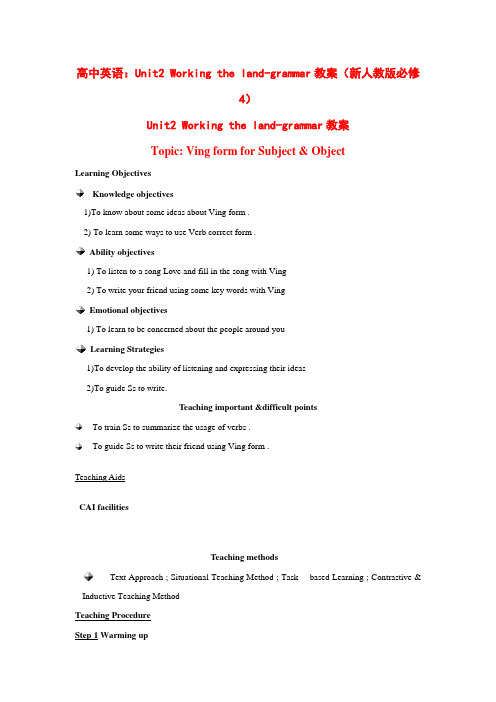
高中英语:Unit2 Working the land-grammar教案(新人教版必修4)Unit2 Working the land-grammar教案Topic: Ving form for Subject & ObjectLearning ObjectivesKnowledge objectives1)To know about some ideas about Ving form .2) To learn some ways to use Verb correct form .Ability objectives1) To listen to a song Love and fill in the song with Ving2) To write your friend using some key words with VingEmotional objectives1) To learn to be concerned about the people around youLearning Strategies1)To develop the ability of listening and expressing their ideas2)To guide Ss to write.Teaching important &difficult pointsTo train Ss to summarize the usage of verbs .To guide Ss to write their friend using Ving form .Teaching AidsCAI facilitiesTeaching methodsText Approach ; Situational Teaching Method ; Task ---based Learning ; Contrastive & Inductive Teaching MethodTeaching ProcedureStep 1 Warming up1)T. gets Ss to discuss some signs .2)To give a definition about Ving form .Step 2 Presentation1)Ss. Find and underline the sentences in the passage that use Ving forms as either thesubject or the object.2) To help Ss draw a conclusion about Ving form .Step3 Practice1) Rewite the sentences using Ving form .2) Complete the sentences using verb correct form .3) Listen to a song and fill in the blanks using Ving form .Step 4 Consolidation1) Talk about the pictures using the key words .2) Talk about our friend using Ving form as much as possible .3) Write about the person you love or respect following an example .Step 5 Homework.1. Summary and remember :*Which verbs should be followed by verb-ing form as object?*Which verbs should be followed by “to do ”?*Which verbs can be followed by both forms?2. Finish your writing if you don’t finish .。
《Workingtheland》教案1全面版
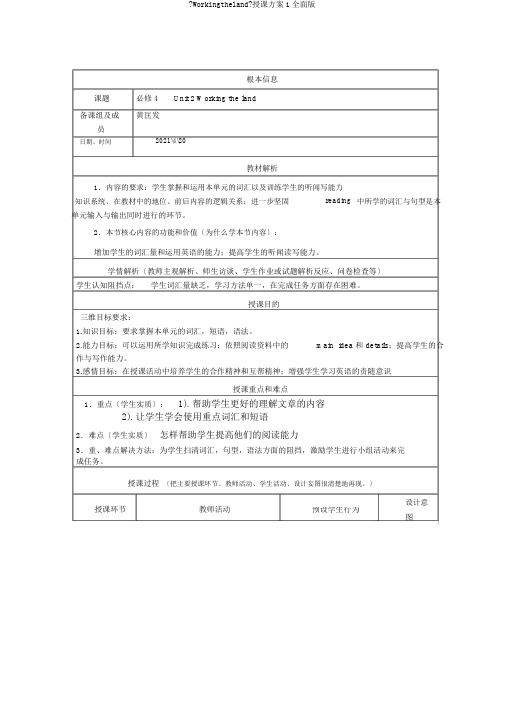
根本信息课题必修 4Unit 2 Working the land备课组及成黄匡发员日期、时间2021\4\20教材解析1.内容的要求:学生掌握和运用本单元的词汇以及训练学生的听闻写能力知识系统、在教材中的地位、前后内容的逻辑关系:进一步坚固reading中所学的词汇与句型是本单元输入与输出同时进行的环节。
2.本节核心内容的功能和价值〔为什么学本节内容〕:增加学生的词汇量和运用英语的能力;提高学生的听闻读写能力。
学情解析〔教师主观解析、师生访谈、学生作业或试题解析反应、问卷检查等〕学生认知阻挡点:学生词汇量缺乏,学习方法单一,在完成任务方面存在困难。
授课目的三维目标要求:1.知识目标:要求掌握本单元的词汇,短语,语法。
2.能力目标:可以运用所学知识完成练习;依照阅读资料中的main idea 和 details;提高学生的合作与写作能力。
3.感情目标:在授课活动中培养学生的合作精神和互帮精神;增强学生学习英语的责随意识授课重点和难点1.重点〔学生实质〕:1). 帮助学生更好的理解文章的内容2). 让学生学会使用重点词汇和短语2.难点〔学生实质〕怎样帮助学生提高他们的阅读能力3.重、难点解决方法:为学生扫清词汇,句型,语法方面的阻挡,激励学生进行小组活动来完成任务。
授课过程〔把主要授课环节、教师活动、学生活动、设计妄图很清楚地再现。
〕授课环节教师活动设计意预设学生行为图Step1. Warming up1.Ask the students whether theyhave grown any plants.if so,whatdid they do to grow them.Step2. Pre-readingTast 1 :some facts 引出课文,提高学生口语表达能力Show some pictures of hungryAfricans and some international factson hunger and poverty .1)Every 8 seconds, a childsomewhere in the world dies fromstarvation,2)More than 800 million people inthe world suffer from hunger andmany of them are fromdeveloping countries.Suggeested answers:1)We can donate some money andfood.2)We can send some children torich countries.3)The government can give themsome food for free.Tast 2 : show a picture ( Yuanlongping)Questions:1)Who is in the picture ?Period one 2)Have you heard of him ?If so , Read tell me something about him.Step3. ReadingTast 1 :prediction 1.学生说出自己种植的一两种植物,描述怎样种植,何时收获等。
Unit2Workingtheland教案(新人教必修4).doc
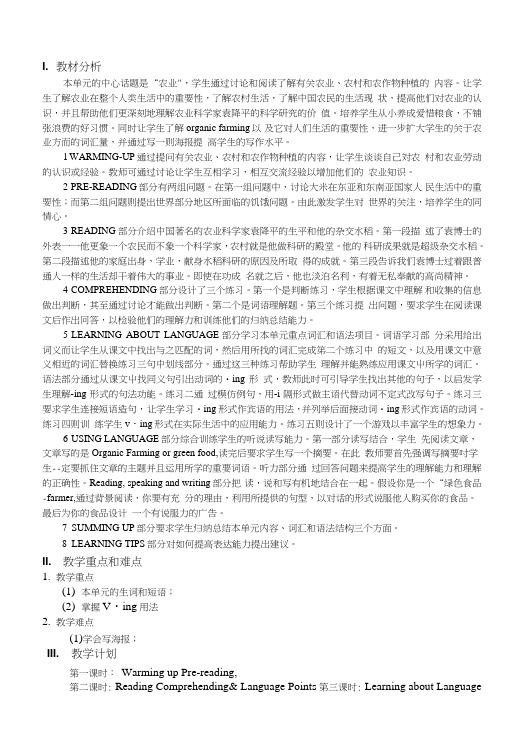
I. 教材分析本单元的中心话题是“农业",学生通过讨论和阅读了解有关农业、农村和农作物种植的内容。
让学生了解农业在整个人类生活中的重要性,了解农村生活,了解中国农民的生活现状,提高他们对农业的认识,并且帮助他们更深刻地理解农业科学家袁降平的科学研究的价值。
培养学生从小养成爱惜粮食,不铺张浪费的好习惯。
同时让学生了解organic farming以及它对人们生活的重要性,进一步扩大学生的关于农业方而的词汇量,并通过写一则海报提高学生的写作水平。
1WARMING-UP通过提问有关农业、农村和农作物种植的内容,让学生谈谈自己対农村和农业劳动的认识或经验。
教师可通过讨论让学生互相学习,相互交流经验以增加他们的农业知识。
2PRE-READING部分有两组问题。
在第一组问题中,讨论大米在东亚和东南亚国家人民生活中的重要性;而第二组问题则提出世界部分地区所面临的饥饿问题。
由此激发学生对世界的关注,培养学生的同情心。
3READING部分介绍中国著名的农业科学家袁降平的生平和他的杂交水稻。
第一段描述了袁博士的外表一一他更象一个农民而不象一个科学家,农村就是他做科研的殿堂。
他的科研成果就是超级杂交水稻。
第二段描述他的家庭出身,学业,献身水稻科研的原因及所取得的成就。
第三段告诉我们袁博士过着跟普通人一样的生活却干着伟大的事业。
即使在功成名就之后,他也淡泊名利,有着无私奉献的高尚精神。
4COMPREHENDING部分设计了三个练习。
第一个是判断练习,学生根据课文中理解和收集的信息做出判断,其至通过讨论才能做出判断。
第二个是词语理解题。
第三个练习提出问题,要求学生在阅读课文后作出冋答,以检验他们的理解力和训练他们的归纳总结能力。
5LEARNING ABOUT LANGUAGE部分学习本单元重点词汇和语法项目。
词语学习部分采用给出词义而让学生从课文中找出与之匹配的词,然后用所找的词汇完成笫二个练习中的短文,以及用课文中意义相近的词汇替换练习三句中划线部分。
新人教必修4Unit2Workingtheland全套教案
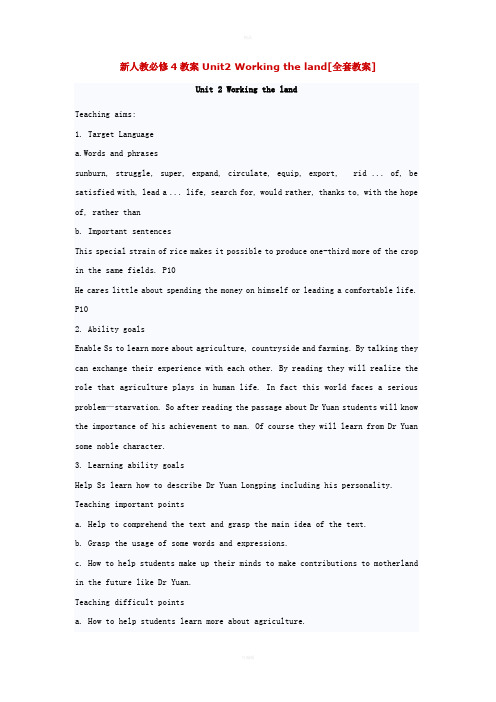
新人教必修4教案 Unit2 Working the land[全套教案]Unit 2 Working the landTeaching aims:1. Target Languagea.Words and phrasessunburn, struggle, super, expand, circulate, equip, export, rid ... of, be satisfied with, lead a ... life, search for, would rather, thanks to, with the hope of, rather thanb. Important sentencesThis special strain of rice makes it possible to produce one-third more of the crop in the same fields. P10He cares little about spending the money on himself or leading a comfortable life. P102. Ability goalsEnable Ss to learn more about agriculture, countryside and farming. By talking they can exchange their experience with each other. By reading they will realize the role that agriculture plays in human life. In fact this world faces a serious problem—starvation. So after reading the passage about Dr Yuan students will know the importance of his achievement to man. Of course they will learn from Dr Yuan some noble character.3. Learning ability goalsHelp Ss learn how to describe Dr Yuan Longping including his personality. Teaching important pointsa. Help to comprehend the text and grasp the main idea of the text.b. Grasp the usage of some words and expressions.c. How to help students make up their minds to make contributions to motherland in the future like Dr Yuan.Teaching difficult pointsa. How to help students learn more about agriculture.b. Help students really master the usage of words and expressions. Teaching methodsTalking, questioning-and-answering activity and reading.Teaching aidsA tape recorder, a projector and a computer.Teaching procedures & waysThe first period ReadingStep 1.Greeting and Revision1. Greet the students as normal.2. Revise the warming up with the following questionHow do you think to grow our main food--rice?-----1)First, the farmers plow the field. They have to make the soil loose enough to plant crops.2)Second,grow some young plants3)Third, they insert the young plants into the loose field.4)At last ,they will get the harvestStep 2 Pre-reading1 Ask the following questions1).What’s the main food in Canada and USA:----- potatoes and bread2).What is the main food in South America:----- corn/maize3 )What is the main food in Southeast Asian countries:----- rice2 Show the students some pictures and ask the questionWhat is happening to these people in East Asian and Southeast Asian countries? Then show more news like that:International Facts on Hunger and Poverty (2002)1)Every 8 seconds, a child somewhere in the world dies from starvation.2)More than 800 million people in the world suffer from malnutrition (营养不良)---799 million of them are from the developing world. More than 153 million of them are under the age of 5.At last ask the students to discuss:If you had the chance to do something to help end hunger in the world, what wouldyou do?Encourage the students to tell their opinions, Then give a conclusion:The only way to solve the food shortage problem is to increase the output of the grain crop per land area through the advancement of science and technology. 3. lead the students to pay attention to the people---Yuan LongpingAsk : What do you know about him?--------Father of Hybrid RiceThen lead to the topic of the reading passage. A Pioneer For All PeopleStep 3 ListeningListen to the tape, try to find out some information of the hero.Name ____________Age ____________Job _____________Education _________Achievement _______Hobbies __________Step 4 Fast readingRead the passage quickly and answer the true-or- false questions• 1.Dr Yuan is more a farmer than a scientist.• 2. Dr Yuan’s kind of rice is the most suitable for China’s farmland.• 3.Dr Yuan would rather work than relax.• 4. Dr Yuan has dreams when he is asleep and also when he is awake. • 5. Dr Yuan enjoys a simple life than most rich and famous people.Step 5 Careful readingRead each paragraph and answer the following questions:Para 1:1.What dose Dr. Yuan look like? Why?2.What is his achievement?Para 2:1. Why did Dr. Yuan want to increase the rice output when he was young?2.How does he help rid the world of hunger?Para 3.41. What kind of life is Dr. Yuan leading?2.What is Dr Yuan’s dream?Step 6 Skimming:find out the main idea of each paragraph.Paragraph------Main Idea1----------His appearance and achievements2----------His birth, education and research3----------His personality4----------His dreamStep 7 Homework1.Learn the poemThe Peasants’ LotLi Shen (772-846)Farmers weeding at noon,Sweat down the field soon.Who knows food on a tray,Due to their toiling day?2. Finish the exercises in Learning about Language.3. Retell the text in about 150 words.Notes:a. Use the first person to retell the story.b. Try to use the proper conjunctions.The second period Learning about Language(The –ing form as the Subject & Object)AimsTo help students learn about The –ing form as the Subject & Object.To help students discover and learn to use some useful words and expressions. To help students discover and learn to use some useful structures.ProceduresI. Warming upWarming up reading aloud the text A PIONEER FOR ALL PEOPLELanguage is learned in context. So let’s first review the text learned yesterday by reading it aloud. Try to force out your English slowly and clearly.II. Discovering useful words and expressionsIn pairs do the exercises 1, 2 and 3 on pages 11 and 12. You must finish them in 5 minutes.III. Learning about grammar1. Read and identifyRead the text about Yuan Longping again, paying attention to the sentences which use the –ing form as the subject and object.In the sentence “Wishing for things, however, cost nothing. “the –ing is used as subject.It can be also used as object of the sentence. For example: Yuan Longping likes playing his violin.2. Consolidating by do exercisesTo consolidate your understanding you will be given 10 minutes to go over exercises 1,2,3,4 and 5 on pages 12 and 13. You may just write on your text book. I mean the student’s book you are working by.III. Ready used materials for The –ing form as the Subject & Object)语法学习——动名词1. 动名词作主语1)名词直接放在句首作主语。
高中英语必修四Unit2Workingthelandreading教案1
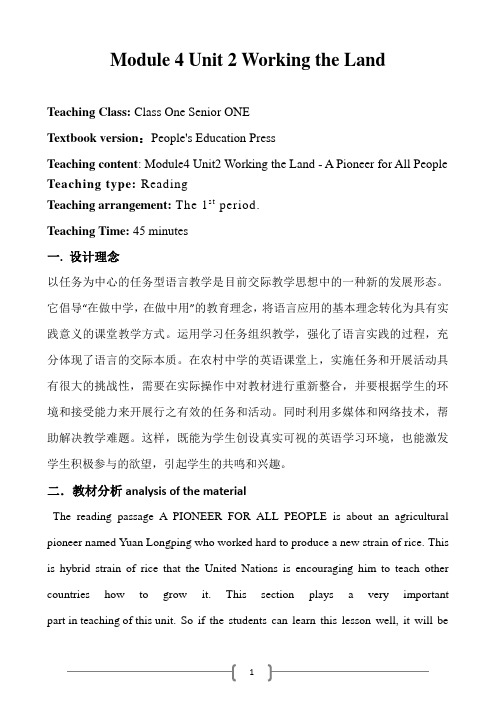
Module 4 Unit 2 Working the LandTeaching Class: Class One Senior ONETextbook version:People's Education PressTeaching content: Module4 Unit2 Working the Land - A Pioneer for All People Teaching type: ReadingTeaching arrangement: The 1st period.Teaching Time: 45 minutes一. 设计理念以任务为中心的任务型语言教学是目前交际教学思想中的一种新的发展形态。
它倡导“在做中学,在做中用”的教育理念,将语言应用的基本理念转化为具有实践意义的课堂教学方式。
运用学习任务组织教学,强化了语言实践的过程,充分体现了语言的交际本质。
在农村中学的英语课堂上,实施任务和开展活动具有很大的挑战性,需要在实际操作中对教材进行重新整合,并要根据学生的环境和接受能力来开展行之有效的任务和活动。
同时利用多媒体和网络技术,帮助解决教学难题。
这样,既能为学生创设真实可视的英语学习环境,也能激发学生积极参与的欲望,引起学生的共鸣和兴趣。
二.教材分析analysis of the materialThe reading passage A PIONEER FOR ALL PEOPLE is about an agricultural pioneer named Yuan Longping who worked hard to produce a new strain of rice. This is hybrid strain of rice that the United Nations is encouraging him to teach other countries how to grow it. This section plays a very important part in teaching of this unit. So if the students can learn this lesson well, it will behelpful to make the students learn the rest of this unit, cultivate the sense of achievement by studying hard and fulfill their dreams.三.学生特征分析analysis of the students1. Although High school students have the basic abilities of listening, speaking, reading and writing, they still need many opportunities to explore and convey meanings; to classify and reflect on their thoughts, feelings and experiences through practice.2 rural school students have the disadvantages of poor English, so during the design of activities I must take into account the specific circumstances of students at different levels and different needs so as to make all levels of students to participate in the activities.四、教学目标Teaching aims:1. Knowledge aims:Enable the Ss to summarize the main ideas of each paragraph and the passage.2. Ability aim: 1. develop students’ability and let them learn different reading skills2. Enable students to talk about Yuan Longping and his hybrid strain of rice3. Emotional aim: 1. encourage students to learn from Yuan Longping and studyhard for the future2. develop students’ sense of cooperative learningTeaching difficult points: develop students reading ability.Teaching important points:let students talk about Yuan Longping and his hybridstrain of riceTeaching methods: Task-based teaching method, Skimming, Scanning and Group discussion.Teaching aids:A multi-media classroom.Teaching procedures & ways:Step 1 Lead-in (4 minutes)Task 1 (Brainstorming)1. Have you ever been to the countryside? What did you see or do there?1.Do you know some grains ?2.What is the main food in all East Asian and Southeast Asian countries?3.Do you know the steps to grow rice?【设计说明】接着运用“头脑风暴”进一步营造宽松和活跃的课堂气氛,充分调动学生的学习积极性,激活学生的思维,培养他们的发散思维能力。
英语必修4-Unit 2 Working the land第一课时教学设计和教学反...

英语必修4-Unit 2 Working the land第一课时教学设计和教学反思(Ss: Really?Step ⅡWarming upT: Have you ever grown any plants? If so, what did you do to grow them? If not, what kind of plant would you like to grow? How will you grow it?S: I have ever grown corn and potatoes. In autumn, my father and I ploughed the soil deep for the first time, then in the next spring, we ploughed the soil for a second time, this time I put the corn seeds into the tunnel following my father. Finally my father covered the corn seeds by ploughing again.S: I never grow any plant. I’d like to plant sunflowers. They look beautiful. They always face the sun when they are young. I dig some holes in my garden, put some sunflower seeds in them, water them and finally cover them with some more soil.T: Very well. Have you ever been to the countryside? What did you do there?S5: Yes, I went there to see my grandfather. In the village I played with other boys in the little stream and caught little fish. I even helped my grandfather get in the corn by cutting the corn stems, which made me tired.T: Are you from a farmer’s family? What do you know about farming?S: Yes, my father is a farmer. In my view, farming is hard work. People have to plant crops, smooth away weeds and get in the crops at the right time. They have to get up early to work in the field so as to protect themselves from the sunshine.T: That’s right. In the north, the biggest worry that farmers have is the drought. When it doesn’t rain, and they can’t irrigate the crops, the crops will die and they will have nothing after hard working.Step ⅢPre-readingThe purpose of this step is to let students know the importance of rice. By answering the two questions, students can easily understand why we call Dr Yuan Longping a pioneer for all people, and why he devotes all his life to the rice research.T: Food is the basic need for man. Rice is a main food in all Eastern Asian and Southeastern Asian countries. It is said that there are 2.4 billion people to eat riceeveryday throughout the world. What do you think would happen if tomorrow there was suddenly no rice to eat?S: I think if that happened, people there would suffer from starvation. They would be panic and the whole country would get into trouble. Maybe the situation that human beings eat human beings will happen.T: That’s too terrible. But this kind of thing once happened in history. Well, if you had the chance to do one thing to help end famine in the world, what would you do?S: I would invent a new kind of plant to produce more food.S: I’ll make a kind of fertilizer to give rice enough nutrition and let them grow quickly and have high product. But first without pollution to our environment.T: A great idea! Your idea is just the same with Dr Yuan Longping. Do you know Yuan Longping?S: I heard that he is an expert on agriculture.T: Yeah, today we are going to read a passage about him. Let’s see how he helped the world to solve the problem- starvation. Please open your books to Page 9.Step ⅣFast ReadingThe reading material is about an agricultural pioneer named Yuan Longping who worked hard at a new strain of rice. It has proved so successful that his technology spread into other countries. The purpose of fast reading is to let students find some useful information, and get familiar with the text. So in this step, teacher can design some questions for students, so that they can easily find the answers and finish the reading task.T: Please scan the passage and find out the answers to the questions on the screen. Then I’d like to ask you to answer them.Show the questions on the screen and give students three minutes to read the text quickly.1. Why did Yuan Longping want to increase the rice output when he was young?2. Is Dr Yuan more of a scientist or more of a farmer? Do you think he is abusinessman?3. How would you describe Dr Yuan’s personality? Use three or four adjectives.4. What do you think is the main reason for his success?5. Dr Yuan thinks that a person with too much money has more rather than fewer troubles. Do you agree or disagree? Why?6. Dr Yuan developed super hybrid rice to help Chinese farmers and hungry people around the world. Can you think of any other major development that would make a great difference to world hunger?Step ⅤExplanationShow the following points on the screen.1. struggle v to make great effortse.g. They have struggled for years to free their country from the enemy.I’m struggling to finish the huge helping you gave me.2. sunburnt adj . sun-tannede.g. His sunburnt skin looks healthy.3. super adj (infml) excellent; splendide.g. You’ll like her, she’s super.You look super in your new clothes.It was super of you to help.4. expand v(cause sth to) become greater in size, number or importancee.g. Metals expand when they are heated.Why not try to expand your story into a novel?5. circulate v(cause sth to ) pass from one person, place, etc to anothere.g. People who circulate false news are to be blamed.Yet reports of this kind have been circulated by our newspapers.The news of the enemy’s defeat quickly circulated round the town.6. equip vsupply sb/sth (with what is needed, for a particular purpose)e.g. Now all fishing boats are radio-equipped.They can’t afford to equip their army properly.Please equip yourself with a sharp pencil and a rubber for the exam.7. export vsend (goods) to another country for salee.g. India exports tea and cotton to many different countries.This company has a large home market but doesn’t export.8. rid ... of make sb/ sth free from (sb/ sth unpleasant)e.g. We all wish that we would rid the world of famine.The farmer recently tried to rid the house of rats.9. be satisfied with, be content withe.g. The young lady isn’t satisfied with the peaceful life.Are you satisfied with his answers?10. would rather, prefer toe.g. I’d rather walk than take a bus.I’d rather you knew that now, than afterwards.Step ⅥListening and Post-readingAt first, let students listen to the tape, and then finish the exercise in Comprehending, we have involved some questions in Exercise 3, so teacher can choose some questions to do. For Ex 1 and 2, teacher can leave some time for students to finish and then check the answers with the whole class.Step ⅦSummary and Homework。
人教英语必修四Unit2Workingtheland教案6
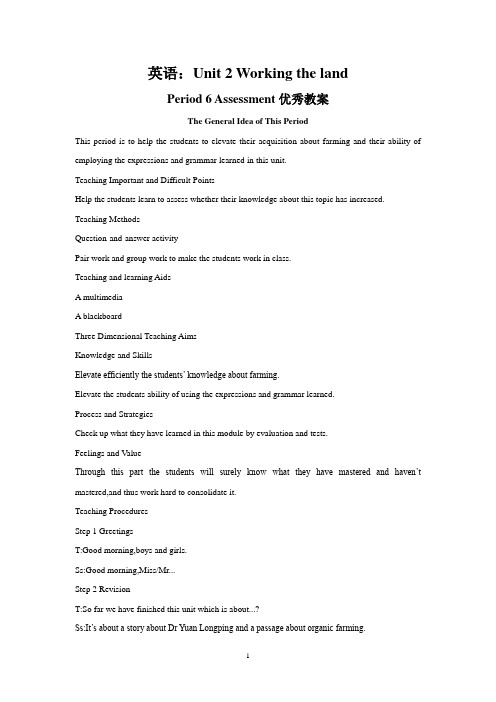
英语:Unit 2 Working the landPeriod 6 Assessment优秀教案The General Idea of This PeriodThis period is to help the students to elevate their acquisition about farming and their ability ofTeaching ImQuestion-and-Teaching and learning AiThree Dimensional Teaching AimsCheck up wThrough this part the students will surely know what they have mastered and haven’tTeaching ProceduresT:T:In this unit we also learnt some drills about giving suggestions and advice,do you still rememberT:Today we are going to see how hard you worked and how much more you know about farming. 非测试性评价Tick the statements according to what you3.I can clearly tell the advantages of organic farming and the disadvantages of the chemical4.I think everyone should knThe Design of the Writing on the BlackboardUnit 2Working the landPeriod 6Assessment ten kinds of agriculturActivities and ResearchThe students may find more to consolidate their knowledge in this unit.And they may also find some1. I can’t stand __________ with Jane in the same office.She just refuses talking while sheA.working;stoppingB.to work;stoppingC.working;to stop赏析:选C。
高中人教版英语必修4+Unit+2+Working+the+land(第二课时)教学案.doc
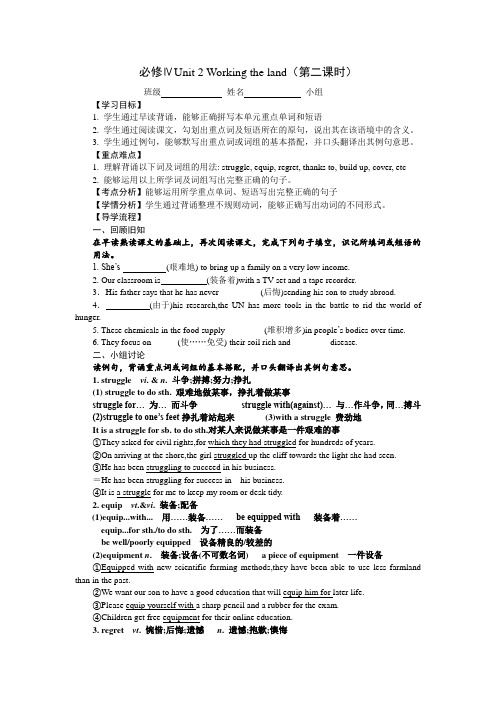
必修ⅣUnit 2 Working the land(第二课时)班级姓名_ 小组_______________【学习目标】1. 学生通过早读背诵,能够正确拼写本单元重点单词和短语2. 学生通过阅读课文,勾划出重点词及短语所在的原句,说出其在该语境中的含义。
3. 学生通过例句,能够默写出重点词或词组的基本搭配,并口头翻译出其例句意思。
【重点难点】1. 理解背诵以下词及词组的用法: struggle, equip, regret, thanks to, build up, cover, etc2. 能够运用以上所学词及词组写出完整正确的句子。
【考点分析】能够运用所学重点单词、短语写出完整正确的句子【学情分析】学生通过背诵整理不规则动词,能够正确写出动词的不同形式。
【导学流程】一、回顾旧知在早读熟读课文的基础上,再次阅读课文,完成下列句子填空,识记所填词或短语的用法。
1. She’s __________(艰难地) to bring up a family on a very low income.2. Our classroom is __________(装备着)with a TV set and a tape recorder.3.His father says that he has never _________(后悔)sending his son to study abroad.4.__________(由于)his research,the UN has more tools in the battle to rid the world of hunger.5. These chemicals in the food supply_________(堆积增多)in people’s bodies over time.6. They focus on______(使……免受) their soil rich and ________ disease.二、小组讨论读例句,背诵重点词或词组的基本搭配,并口头翻译出其例句意思。
- 1、下载文档前请自行甄别文档内容的完整性,平台不提供额外的编辑、内容补充、找答案等附加服务。
- 2、"仅部分预览"的文档,不可在线预览部分如存在完整性等问题,可反馈申请退款(可完整预览的文档不适用该条件!)。
- 3、如文档侵犯您的权益,请联系客服反馈,我们会尽快为您处理(人工客服工作时间:9:00-18:30)。
Unit 2Working the land假如你住在一个涉外小区。
社区委员会请你帮忙根据以下提示用英文写一封电子邮件,将社区邀请居精彩美文Hi, everyone!To get close to nature and do more exercise, all residents w ho are interested in farming are in v ited to take part in an acti v ity organized by the Committee of our community. Weather permitting, we'll ride bicycles to do some farming this Saturday on a farm, about 5 kilometres away from our community from 9:00 am to 12:00 am. We can grow some vegetables, plant some flowers, and raise fish in the lake nearby. You will be trained and guided w hile farming. Not only w ill you enjoy the pleasure of labour and relax, but also you can taste fresh products picked by your own hands if you are willing to.Everyone is welcome to attend!名师点睛1.文章体裁:应用文——电子邮件。
2.行文逻辑:写邮件的目的→邮件的内容→表达愿望。
3.词汇短语:运用了较高级的词汇和短语。
如:be interested in(对……感兴趣),take part in(参加),raise fish(养鱼),be willing to do(愿意做……)等。
4.句式句法:运用了多样化的句式结构。
如:①定语从句:who are interested in farming are invited to take part in an activity organized by the Committee of our community;②独立主格结构:Weather permitting;③现在分词短语作状语:while farming;④倒装句:Not only will you enjoy the pleasure of labour and relax, but also you can taste…;⑤过去分词作定语:picked by your own hands;⑥状语从句:if you are willing to等。
Ⅰ.单词荟萃1.________adj.引起烦恼的;令人不安的→________v.打扰;麻烦2.________v t.& v i.循环;流传→________n.循环;流传3.________n.自由;自主→________adj.自由的;免费的4.________v t.& v i.配备,装备→________n.设备5.________n.工作,职业;占领→________v.占用,使从事,把注意力集中于……;占领,占据6.________v t.使迷惑;使为难→________adj.感到迷惑的→________adj.令人迷惑的7.________v t.& n.后悔,遗憾→________adj.后悔的,遗憾的8.________n.生产,制造→________adj.生产的→________v. 生产,制造9.________n.发现,发觉→________v.发现10.________v t.减少,缩减→________n.减少,缩减Ⅱ.短语检测1.从那时起_____________________2.寻找_____________________3.幸亏,由于,因为_____________________4.使……摆脱/除去_____________________5.对……感到满意_____________________6.宁愿,宁可_____________________7.逐渐增强;建立;开发_____________________8.导致,造成(后果) _____________________9.集中(注意力、精力等)于_____________________10.使……免受(影响、伤害等);使……不含(有害物) _____________________Ⅲ.佳句再现1.Yuan Longping grows _________________________ super hybrid rice.袁隆平种植的水稻被称为超级杂交水稻。
2.Using his hybrid rice, farmers are producing harvests __________________before.用他的杂交水稻种子,农民们种出的粮食比以前多了一倍。
3.____________________leads to poor health and, therefore, sickness.没有足够的食物导致身体不健康,从而引发疾病。
4.____________________hunger is very important for some African countries.对一些非洲国家来说,摆脱饥饿是非常重要的。
5.______________new scientific farming methods, they have been able to use less farmland than in the past.有了新的科学的耕种方法,他们能够使用比过去少的耕地(生产出与过去同等量的稻子)。
Ⅳ.课文回顾Yuan Longping, 1.________(know) as China's “father of hybrid rice”,is one of China's most famous scientists. Over the past five decades, he 2.________ (struggle) for an approach to increasing the output of rice without expanding the area of the fields. Born in 1930, Dr Yuan graduated from Southwest Agricultural College in 1953. Since then, 3.________ (find) ways to grow more rice has been his life goal. At that time, 4.________ (hungry) was a 5.________ (disturb) problem in many parts of the countryside. In 1973, he became the first agricultural pioneer in the world 6.________ (grow) rice that has a high output. His dream to help the world get rid of hunger came true.Dr Yuan devoted himself to the research into agriculture and 7.________(honour) by UNESCO & FAO. He is quite 8.________ (satisfy) with his life but doesn't care about being famous or leading a 9.________ (comfort) life. 10.________he is 70 years old, he is still working on the research into agriculture.单词点睛●1 struggle v i.& n.(to try very hard to do sth when it is difficult or when there are a lot of problems)斗争,拼搏;努力;挣扎struggle with与……斗争struggle for 为争取……而斗争struggle against 与……斗争;为反对……而斗争struggle to do sth (=make great efforts to do sth) 努力做某事struggle to one's feet 挣扎着站起来【易混辨析】struggle, fight与battle(1)struggle意为“斗争”,指那些费力、艰苦、时间也较长的斗争。
(2)fight意为“战斗”,指人与人或动物与动物用武器或者不用武器的战斗。
(3)battle 常指战争中的一次战役。
【活学活用】(1)[2015·陕西卷·阅读D] Robinson suggested that may be because parents themselves struggle to understand the tasks.鲁宾逊暗示这可能是因为父母自己在努力理解孩子们的功课。
(2)[2014·陕西卷·阅读C] Why do Americans struggle ____________watching their weight, while the French, who consume rich food, continue to stay thin?为什么美国人拼命注意体重,而法国人吃着油腻的食物却仍然很瘦?(3)Most animals have to ____________existence in a dangerous world.大多数动物得在这个充满危险的世界上为生存而竞争。
(4)The soldier was badly wounded but he struggled __________his feet at last.这个战士受了重伤,但最后他还是挣扎着站了起来。
